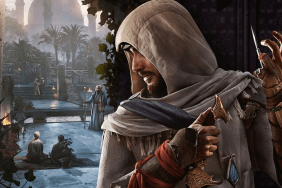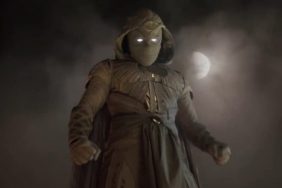Scoring a video game is incredibly hard and takes an equal dose of talent, time, and patience. Luckily, composer Gareth Coker has all three skills necessary to craft amazing music for popular titles such as Immortals Fenyx Rising: The Lost Gods, Halo Infinite, Ori and the Will of the Wisps, and many more.
Lucky for us, Coker was able to chat with ComingSoon about his career, his scoring process, and some of the techniques he uses to craft his astonishing music. Gareth is currently scoring ARK II and ARK: The Animated Series (2022) featuring an all-star cast including Vin Diesel, Gerard Butler, Michelle Yeoh, Malcolm McDowell, Elliot Page, Ragga Ragnars, David Tennant, Karl Urban, and Russell Crowe.
MORE: Uncharted: Legacy of Thieves Collection Announced for PS5 & PC, Remasters Both PS4 Titles
You’ve been involved in some enormous video game series, including Halo, ARK, and Immortals – what drew you to the world of video game composing?
It’s mostly due to being the form of media that I feel most familiar with. I feel drawn to games because I feel like I’ve spent the most time with them since I was a child. Also, some of my fondest memories are playing video games with various family members, thus the idea of being able to contribute to the creation of those kinds of memories for others is something that is extremely appealing.
Additionally, I think the potential for storytelling in games is absolutely vast and we are still – relatively speaking – in the infancy of what games are capable of, at least compared to film and television. It is extremely exciting to be a part of that moving into this current generation and beyond.
What was your first big break – or the project that gave you the opportunity to really flex your talents?
Without doubt, Ori and the Blind Forest. I was given total creative freedom by Moon Studios and Microsoft to establish the musical DNA of the game (and ultimately the entire intellectual property). Considering I was very inexperienced at the time (2011) I consider myself very fortunate to have been given such a high level of trust for my first substantial soundtrack, especially one that was recorded live.
The scope of the game, not just in terms of its gameplay, but also the variety of environments, really allowed me to try out many different kinds of instrument combinations but also provided the unique challenge of having to take those combinations that suited each environment, and forge them into a cohesive whole. We were able to do this by 1) using the orchestra as the glue between each area, letting the more esoteric instruments shine and do their thing while the orchestra provides sonic consistency, and then 2) through theming and especially re-use of themes in different contexts, which provided continuity to the soundtrack.
Lastly, the developers really allowed me to get close to the game by giving me full access to the game while it was in development, which enabled me to get a deep understanding of the player experience. For me, once I as a composer can really put myself in the players’ shoes, I write a score that is much more in tune and synergistic to the game.
What is your musical process when tackling a video game like Halo Infinite? There’s so much music involved; I would imagine the challenge is making the score varied enough so that it’s noticeable without being distracting to the player.
Well, fortunately on Halo Infinite, I am sharing the load with two other composers, Curtis Schweitzer and Joel Corelitz, so even though there is a lot of music, it’s not all on one composer. That said, I have worked on other projects, such as Immortals Fenyx Rising, or ARK, where there are several hours worth of score assigned to just one composer, yours truly, so the workload really depends on the project’s needs, scope, and workflow of each respective development team.
Variety is important in games, but I feel like repetition has become a bit of a dirty word in video game music, and it’s not necessarily something we should be afraid of. Re-use and constant adaptation of themes is a really important skill in-game scoring. If done well, the placement of these themes with the right scene at the right time can provide so much more to the player than simply a score that is purely focused on variety and avoiding repetition. If one chooses to score a game this way, rather than say “through-compose” (scoring from A to B with very little thematic re-use) – there is a very fine balancing act to find so that you are not overusing one theme in the same way too much. Executing that balancing act effectively usually comes as a result of the composer and/or various members of the music team spending time with the music itself in-game and getting a feel for what works and what doesn’t.
How has your musical style evolved over the years from Minecraft in 2009 to Immortals Fenyx Rising: The Lost Gods in 2021?
I think my writing is a lot more focused now than it was at the beginning of my career. I spend a lot of time at the beginning of a project trying to define the sound/feel for that respective game. I think a score that I write in 2021 is really going to sound unique to that particular project and not interchangeable with anything else I do from another project written at the same time. That might not have been the case a decade ago.
What do you look for before signing on to a particular project?
A good story, and I generally prefer the opportunity to create a new musical DNA from scratch. Also in an ideal world, I am looking to work with a studio that will give the composer a degree of agency not just over what the music itself should be but how it is used and where it is played in a game.
MORE: Alan Wake Remastered Gets Gameplay Footage, Launching in October
What appealed to you about Immortals Fenyx Rising?
We’ve had a lot of games set in Greek mythology in recent years, most notably Hades and God of War, but Immortals was doing its own spin on the setting, and that is abundantly clear from the art style and general tone of the game. The great thing about the word ‘mythology’ is that it gives you tremendous creative license. This, combined with the chance to work on a big sprawling open-world title for the first time, made it a very exciting title to work on.
With Immortals Fenyx Rising, you use authentic Greek instruments – what led to that creative decision, and what challenges did this approach present?
We wanted to find a balance between having music that matched the fantastical nature of the game but also ground it with a little bit of authenticity. Going too far in one direction of the other didn’t seem right, so we used traditional Greek instruments to add the flavor of Greece, while using magical/synthetic elements in the music to reflect the mythological part of the game, and then finally the orchestra to add heft and gravitas to all of the big, epic moments featuring the various gods that appear in the story.
I had three different lyres commissioned, really two lyres, and one phorminx, all tuned to different scales. These plucked instruments are featured plentifully across the 3.5-hour soundtrack. Additionally, I had an aulos commissioned for the Tartaros vault areas of the game. The aulos is a fascinating reed wind instrument that is – to me – probably the most authentic and singularly ‘Greek’ sounding instrument that exists. There is nothing else quite like it. You can hear it most prominently in the track ‘Aulos of Tartaros’ from the soundtrack.
Was there a specific moment, scene, or character in Immortals Fenyx rising that helped inform your score, or, at least, gave you a springboard to launch from? Or was the soundtrack based solely around the aforementioned Greece setting?
It’s a mixture of the tone of the game, and the setting. I kind of settled on the idea of “what if Greek Mythology combined with Fantasia” and I think that’s where the soundtrack ended up. It took a bit of experimentation to find this overall sound, but once we got there, that underlying idea was the foundation for the vast majority of tracks in the game.
The other part of the game that affected how I wrote the music was more based on the game’s core design and how music would support it. The game’s main map is divided into six clearly themed areas. The areas are where the antagonist Typhon has imprisoned six different gods (who the player has to rescue). Each area of the game has a distinct musical identity. Furthermore, while the player is exploring each area, the music changes according to how the player is traversing the environment. But… it’s the same core piece of music. So you can be traversing Aphrodite’s area and one of her three core music suites will play, but that suite will change based on whether you are flying, horse-riding, walking, or are in combat. So each music suite has four different states that change dynamically. This was another part of the writing process that took some time to figure out, as these 4 different states had to sound good on their own, but also be able to switch to another state on the fly. The music for when you are flying around the environment sounds light and airy (while appropriately themed for each area, e.g. Aphrodite’s flying music sounds unique compared to Hermes’ flying music). This is differentiated from horse-riding music which has more momentum/pace because it’s the fastest way to traverse an environment. However, the horse-riding music still had to feel related to the flying music in some way (usually through melody).
I’ve done my best to distill this into a digestible format, but you can get an idea of how multi-layered things can get when producing a game soundtrack. Six different environments in the game, three different musical suites for each environment, all with four different states to track. So that’s 72 different tracks to worry about, and that’s before we get into the music for the Tartaros Vaults (the tracks featuring aulos), the boss fights, or the cutscenes! I like a challenge though, and Immortals gave me a really huge, wonderful playground to explore musically.
You’re currently working on ARK II and ARK: The Animated Series as well – what can you tell us about these anticipated projects?
What I am most excited about with ARK: The Animated Series is that it will bring ARK to a new audience and also make ARK’s incredible lore + story more accessible to those who might not have had the time to really dig deep into the story in the main game, which does require a very large time commitment. Having read all the scripts for the show and seen the animation, I am really confident that the series won’t just be a love letter to the game, but it will stand alone as a really great entertainment series.
As for ARK II, I cannot say much about it, other than it will be a return to the more primal nature of the game, this can be seen from the first trailer that we released at The Game Awards last year.
ARK is clearly a franchise you’re familiar with, how has the music evolved over the course of the series?
I don’t think anyone could have seen how successful ARK has been since it was first released. Never in my wildest dreams did I think I’d be sitting here having done the music for the core game, its five expansion packs, and now starting work on the sequel for the game and an animated series.
Studio Wildcard, the developer, are also fantastic supporters of live music and we’ve recorded a huge amount of music since the game first came out. Moving forward it’s really great to know that in the coming months/years we’ll be able to continue to support musicians who have been hit incredibly hard by the pandemic – by getting them contributing their considerable talents to the soundtracks for the game and series.
The music itself has always been loud and proud, but, for example, the most recent expansion pack – ARK Genesis Two – had a very strong synthetic element which I did not think we’d be exploring back when I first started working on the game. I also think the storytelling in ARK has really come on in leaps and bounds over the years and that is summed up by the end of ARK Genesis Two, which, if the comments online are to believed, was quite an emotional ending for those that have completed it, and this is summed up by what might be my favorite track that I’ve written for ARK, a track called ‘Journey’s End’.
What are you most excited for fans to experience (musically speaking) in ARK II?
A little too early to say at this point, but if you listen to the ARK II Main Theme on my YouTube channel, it’s very clear that there is going to be an emphasis on something that is a little darker, a lot more raw + brutal + primal. More than that, I cannot say just yet!
Do you gave any additional projects you can talk to us about – Halo Infinite, perhaps?
I can’t say too much about Halo Infinite, but we are getting close to release and I’m really excited for the world to see what myself, Curtis, and Joel have cooked up. It’s been a challenge to step into a series, which has such a massive musical history but my hope is that fans feel we’ve been both respectful to what’s come before and that we’ve also managed to push things forward a little bit. We shall find out on December 8th.
A continued thanks to everyone who listens to and follows my work. It’s easiest to keep up with what I’m doing via my Twitter account which is simply @garethcoker. Thank you for having me!










